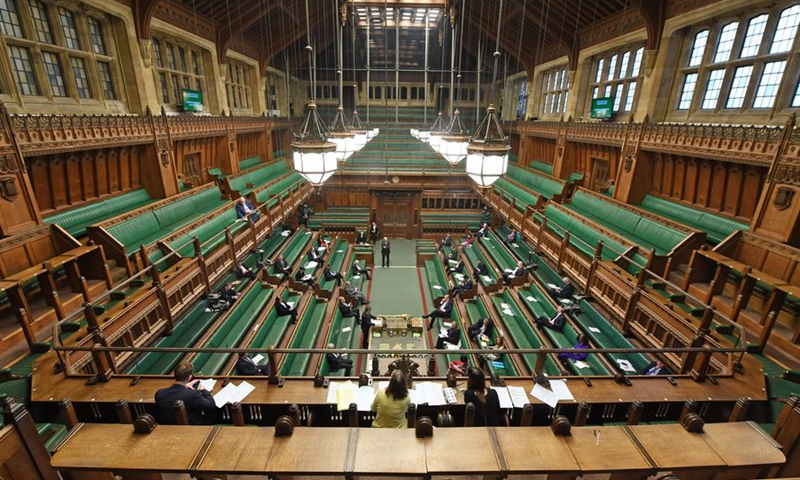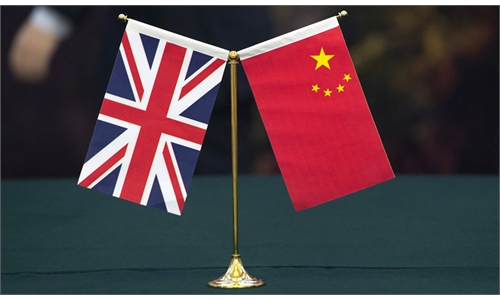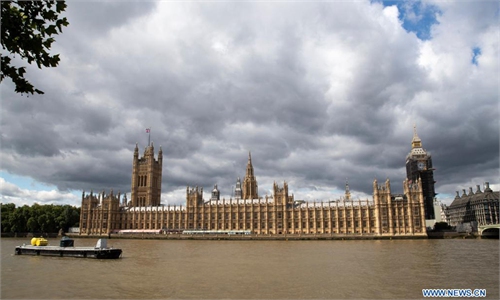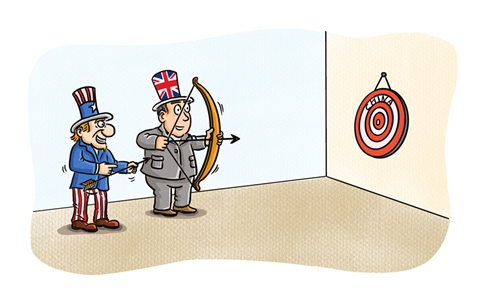Chinese experts refute UK media outlets’ hyping ‘China spy’ as smearing and harming normal economic cooperation
Britain needs to change China policy so as to increase engagement to benefit its recovery: expert

Photo taken on March 23, 2020 shows a general view of the House of Commons in London, Britain.(Photo:Xinhua)
Some UK politicians and media outlets keep sensationalizing "China spy" allegations, as Britain's House of Commons has reportedly approved legislation that would ban Chinese surveillance equipment from government facilities and military bases. Chinese observers on Thursday said these anti-China forces are smearing and slandering China with the aim to worsen bilateral relations and hinder normal economic and trade cooperation.
The UK government urgently needs an in-depth understanding of China, as its knowledge of China has seriously deviated in recent years amid growing nationalism in the UK and US pressure, observers said, urging the UK to change its China policy so as to attach importance to engagement with China, especially on pragmatic cooperation that benefits the UK's economic recovery.
On Wednesday, the UK's lower house of parliament approved a new law that would ban Chinese surveillance equipment from government buildings and military bases, Reuters reported. The legislation needs approval from the House of Lords before it becomes law.
British lawmakers have called for a ban on the sale and use of security cameras made by Chinese leading manufacturers Hikvision and Zhejiang Dahua Technology over so-called privacy fears, according to the report.
Neither company replied when reached by the Global Times on Wednesday.
Some British media outlets and politicians are racking their brains to hype "insecurity" with Chinese technology in order to catch the domestic audience's attention and gain political benefits, as anti-China nationalist forces in the UK always consider China a "rival" and even a "threat," Li Guanjie, a research fellow from the Shanghai Academy of Global Governance and Area Studies, told the Global Times on Thursday.
"By abusing the concept of national security, they are attempting to use administrative measures to justify their crackdown on leading Chinese industries, for example, Huawei's 5G," Li said, referring to the UK's consideration of a response to recent US restrictions on tech investments in China.
From the "spy balloons" hysteria to the "spy camera," certain Western media outlets led by the BBC keep hyping "China spy" and "China infiltration" allegations to ramp up anti-China paranoia. For example, the BBC asked in a column published on Tuesday, "Has the UK woken up to the China spy challenge?" while The Telegraph claimed British intelligence services will unmask "a number of Chinese spies" in the coming months.
In June, the BBC purposely made a story about "hacking" a 6-year-old Hikvision camera and claimed it had found security flaws. Hikvision refuted the BBC's allegation, saying that the media outlet sensationalized a problem that was already fixed and the BBC's test was conducted on an unsecured network. In a separate statement, the company stressed that it does not have government backdoors in its products.
"The incident underscores one of the many dilemmas of China-UK relations, as anti-China sentiment is pushing British politicians to take a harder stance on China, which will set material barriers on economic and trade cooperation," Yang Chengyu, an associate research fellow at the Institute of European Studies of the Chinese Academy of Social Sciences, told the Global Times on Thursday.
The UK is China's third-largest trade partner and second-largest investment destination in Europe, while China is the European country's largest trade partner in Asia. Official data showed that bilateral trade exceeded $100 billion in 2022 despite global challenges.
Unlike the US, the performance of the UK economy is sluggish. Its inflation is almost the worst among major economies and its economic prospects are gloomy. If some British politicians continue to follow in the steps of the US and view China-UK economic and trade cooperation with an ideological bias against China, there is no doubt that the UK's economy will face more uncertainties," Yang said.
According to data released by the British Office for National Statistics, UK GDP fell by 0.5 percent in July, shrinking at the fastest pace since December 2022. Following the figure, major international investment banks cut their growth forecasts, with Goldman Sachs having revised its annual growth forecast to 0.3 percent from 0.5 percent, US news outlet CNBC reported.
"The UK government needs to change its China policy," Li said. Although direct engagement with China is one of the important changes in the Sunak government's China policy, the other two pillars of strengthening "national security protections" and alignment with partners are the core, he said.
While conducting direct engagement, the UK government should focus on pragmatic cooperation, Li said. The industrial structures of the two countries are complementary and the development potential is huge, and they are both advocates of free trade. Despite disagreements, China and the UK could still find many areas of common ground, Li said.
At the end of August, British top diplomat James Cleverly visited China - the first visit to Beijing in five years by an incumbent UK foreign secretary - making the first tentative steps to repair the ties.
Moreover, Chinese Premier Li Qiang met British Prime Minister Rishi Sunak on the sidelines of the Group of 20 Summit on September 10.
Sunak said that Britain is willing to conduct constructive and candid dialogue with China, strengthen practical cooperation in such areas as economy and trade, and science and technology, properly handle differences, jointly tackle climate change and other global challenges, and build stable and mutually beneficial Britain-China relations, the Xinhua News Agency reported.



